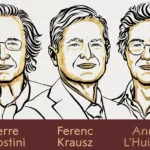Groundbreaking Science Rewarded
In a momentous announcement, Professors Katalin Kariko and Drew Weissman have been jointly awarded the Nobel Prize in Physiology or Medicine for their pioneering work in developing mRNA technology that led to the creation of COVID-19 vaccines.
A Revolution in Vaccine Technology
The mRNA technology, originally experimental, has become a global lifesaver by protecting millions of people against severe COVID-19. This technology has also ignited research for applications beyond the pandemic, including cancer treatment.
Fast-Tracking Vaccine Development
Traditional vaccines relied on weakened viruses or bacterial fragments. In contrast, mRNA vaccines, like Moderna and Pfizer/BioNTech, employ a different approach. They carry genetic instructions to produce a specific viral protein. Once injected, our cells generate the viral protein, prompting our immune system to recognize and combat the threat.
The Power of Genetic Instructions
The beauty of mRNA technology lies in its versatility. With the right genetic instructions, you can swiftly develop vaccines against various diseases, a far more efficient approach than traditional methods.
Targeting Cancer with mRNA
Researchers are even exploring mRNA’s potential to train the body to fight cancer. By identifying abnormal proteins produced by tumors and creating vaccines to target them, scientists aim to bolster the body’s ability to combat cancer.
From Backwater to Breakthrough
Professors Kariko and Weissman embarked on this journey in the 1990s when mRNA research was considered a scientific backwater. Their perseverance and innovative work paved the way for the mRNA vaccine breakthrough.
Harnessing RNA’s Role in the Body
RNA’s natural role in the body is to convert genetic instructions into proteins. Professors Kariko and Weissman faced challenges, such as minimizing inflammation in early experiments. Still, they successfully refined the technology, enabling large-scale production of the intended proteins without adverse effects.
Current Pursuits
Professor Katalin Kariko now teaches at Szeged University in Hungary, while Professor Drew Weissman continues his work at the University of Pennsylvania. Their work has not only changed the course of the pandemic but has the potential to reshape the future of medicine.
The Nobel Prize committee recognized their outstanding contribution to science, acknowledging the profound impact of their work in our fight against one of the most significant health threats in recent history.
Also Read: Glow From Nuclear Power Station Spotted 150 Miles Away In Pure Water






